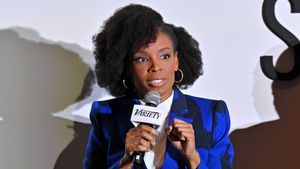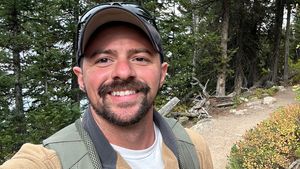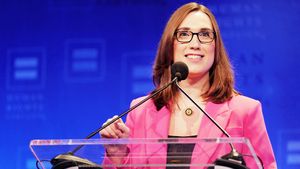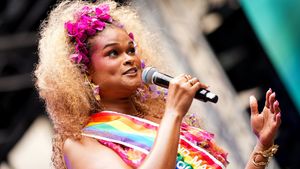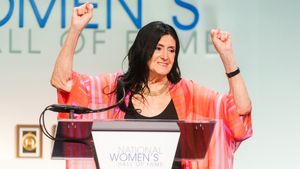CONTACTAbout UsCAREER OPPORTUNITIESADVERTISE WITH USPRIVACY POLICYPRIVACY PREFERENCESTERMS OF USELEGAL NOTICE
© 2025 Pride Publishing Inc.
All Rights reserved
All Rights reserved
Scroll To Top




By continuing to use our site, you agree to our Private Policy and Terms of Use.
How I Dealt With Transphobia In the Publishing World

For ten years as a Texas public school teacher, I had to perform an inauthentic version of femininity. Administrators told me to keep my nails manicured and wear high heels if I wanted to be considered for career advancement opportunities. In performance evaluations, I was told to use more emojis, ask about my colleagues' families, and smile more. This "coaching" was a humiliating continuation of feedback I'd been getting all my life: Act like a lady.
I am not a lady. Never was. And sometime after turning 30, I gave up trying to be or wanting to be. When one of my closest friends came out as nonbinary, I found the word to describe myself, but I didn't feel safe coming out while working in public schools -- not right after the defeat of the HERO legislation that would have protected Texans from transphobic discrimination.
In launching a writing career last year, I was faced, again and again, with a seemingly simple task: writing your author bio. Here was a chance to define myself to the world on my own terms. To break free from a gender identification that had chafed all my life. When I came out on social media New Year's Day of 2019 as nonbinary, my author bio finally identified me as "they."
But I had one item of housekeeping to complete: a short story of mine had previously been accepted to a journal and was slated for publication with a single "she" pronoun in the bio. When I emailed the editor with a request to change it to "they," the response was less than accommodating: "It appalls my English teacher self to use a plural to stand for a singular...What if I just ... skip the pronoun altogether? I'll do it the other way if that's important to you. But it hurts."

On Twitter, at least, the publishing world projects an image of trans-inclusivity. Many literary agents and publishers call for #OWNvoices queer writing in their manuscript wish lists, and members of the #writingcommunity frequently specify their pronouns in bios. But I quickly learned that Twitter culture does not represent the entire publishing world.
This exchange was my first professional interaction after coming out. I was in a raw, vulnerable place and this email felt like a punch to the gut. Part of me wanted to crawl right back in the closet and hide.
But then I started to get angry. Remember, I too am a recovering English teacher, so I couldn't help but analyze their rhetoric and notice how every line was calculated to disguise an ugly prejudice, couching transphobia in seemingly polite terms. To break it down: The editor starts off by abdicating responsibility for their position. They're not transphobic, they're just a stickler for grammar. They then point to a "solution" that erases my trans-ness, by offering to "skip the pronoun allogether" alongside (what later proved to be) an empty offer, all while gaslighting me and centering themselves as the victim.
I wrote back, trying my best to "call them in," rather than calling them out. But they were not interested in promoting acceptance of trans and gender nonconforming people.

This is how "good liberals" disguise erasure: They deflect responsibility for their actions, rescind offers of performative support, and offer "solutions" that put them in control while implying that your identity is a mistake.
I ultimately decided to pull my story from the magazine and shared our entire exchange on Twitter. In 2019, there should be accountability for publishers who won't respect trans identities. No one else should be made to feel as erased and alone as I did during this exchange. After my story made its rounds, several literary magazines reached out to invite me to submit my work, including Out.com. The over 20,000 likes (and counting) the post has garnered at time of printing make me feel like an army is backing me up-- not just with this editor, but with the relatives, teachers, counselors, supervisors, and bullies who've tried to police my gender all my life.
[Editor's Note: Out received a statement from Gail Entrekin, the editor Simone was in contact with: "I both apologize for my ignorance and inadvertent cruelty and will ask [them] to consider serving as consultant on the next issue of our press's (Hip Pocket Press) other magazine, Sisyphus, a magazine of art, culture and language."]

I hope my experience will encourage others facing gender discrimination to stand up for themselves, if it's safe to do so. And I hope that the public outcry will serve as a warning to those who hold outdated transphobic attitudes: your time is up.
We're taught that grammar is a necessary scaffolding for language -- without which communication would be impossible. The truth, however, is that English grammar is needlessly complicated, needlessly binary. This complexity allows those with privilege -- those who benefit from the status quo, who've had access to the types of education that teach them every finicky rule -- to exclude anyone born without that privilege. These gatekeepers often use grammar as a tool of oppression. And when it's not rooted in latent transphobia, grammar policing is often motivated by classism, racism, xenophobia, and/or ableism.

In the last few days, many educators have reached out to share how they are promoting inclusive language in their schools. Their courageous efforts made me realize that even though I'd said I "always" taught this to my kids, I'd missed so many opportunities to do the same. Acceptance of a singular they/them pronoun is just the first baby-step towards creating a more inclusive language. If we want to make English accessible for all, we've got idioms to decolonize, grammar to demystify, and binaries to smash. And we're going to need everyone who is a language influencer -- teachers, librarians, writers, editors, agents and more -- not to cling to the past, but to lead this transformation towards a more equitable common language.
Latest Stories
Jane Hilton's 'Cowboys & Queens' explores the modern American dream
March 28 2025 6:31 PM
48 steamy celebrity Calvin Klein ads the gays won't forget
March 17 2025 5:42 PM
HIV Is Not a Crime Day: Films about HIV & AIDS that you should watch
February 28 2025 1:23 AM
Virgin Voyages' Resilient Lady redefines luxury at sea
February 25 2025 8:28 AM
Get ready for pride on the slopes at Whistler Pride 2025
January 09 2025 3:10 PM
30 trans icons who have been featured in the Out100
December 31 2024 1:20 PM
Out and About with Billy Eichner
December 20 2024 3:28 PM
8 of Jonathan Groff's best (and most iconic) gay roles
March 26 2025 1:58 PM
27 LGBTQ+ reality dating shows & where to watch them
March 24 2025 11:32 AM
Queens of Instagram! The most followed drag artists around the world
March 10 2025 4:09 AM
All the LGBTQ+ (and queerish) characters in the MCU so far
February 26 2025 5:31 PM
Murray Bartlett's 8 best gay roles in TV shows & movies
February 12 2025 2:33 PM
These queer icons show why they are the Real Nasty Pigs of New York
January 14 2025 4:28 PM
Unleash your Capital kink at MAL Weekend 2025
January 07 2025 3:17 PM
All the 'Drag Race' queens on OnlyFans (& what they're showing)
March 21 2025 10:57 AM
The future of rap is female and queer: 27 rappers slaying the game
March 05 2025 11:00 AM
Love is in the air! Unforgettable gay kissing scenes from TV & movies
February 12 2025 3:07 AM
Experience Thailand: The ultimate LGBTQ+ paradise
January 14 2025 10:14 AM
French Polynesia: A journey to LGBTQ+ heaven on Earth
January 07 2025 8:15 AM
Get mile high with pride at Aspen Gay Ski Week 2025
December 23 2024 4:24 PM



























